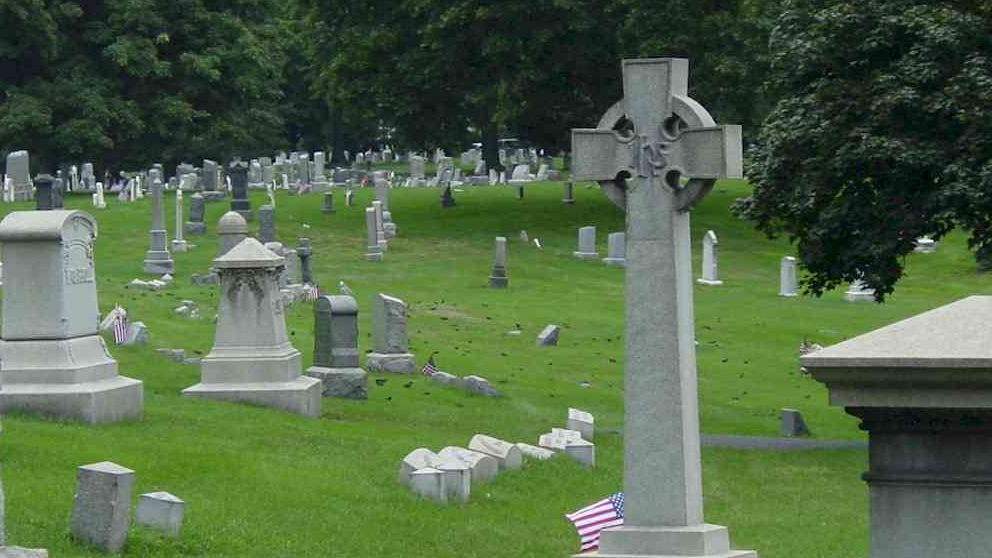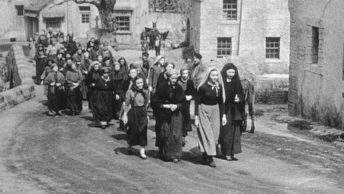The idea of death often frightens us, and so as a society, we sometimes joke about it as a way of coping with our fears and uncertainties. For instance, there’s the story about a man from Illinois who was going to take a winter vacation in Cancun, Mexico, with his wife meeting him there one day after he arrived. At the hotel he sent an e-mail to his wife back in Chicago; however, he mis-typed her address on his laptop, and unknowingly sent the e-mail to a widow in Cleveland who had just buried her husband a few days earlier. This woman’s grown daughter, who happened to be home with her, heard her gasp in shock and fall to the floor in a faint. Hurrying to her mom, the young woman found this message on the computer screen: “My dearest, I just checked in. I can hardly wait to see you when you arrive here tomorrow. Your loving husband. P.S. It sure is hot down here” (Fr. Joseph Robinson, Guiding Light, Cycle C, p. 171).
People often have strange, unusual, or misguided ideas about death and the afterlife. For instance, some believe in reincarnation: supposedly, even though Scripture denies it (cf. Heb. 9:27), we keep coming back to earth and live our lives over as different persons, until we finally get it right. Others believe that almost everyone immediately goes to Heaven, and very few people end up in Hell—even though Jesus clearly warns of the very real danger of eternal damnation. There are still others who believe that there is no life after death whatsoever, and that when we die we entirely cease to exist—even though this contradicts the yearning for eternal life found in every human heart. The mystery of just what happens after we die is the most important question personally confronting every single one of us. Fortunately, through Scripture and tradition, the Church offers us a reliable and reassuring answer. We are created to exist for all eternity, and those who allow Jesus to live within them on earth will truly live in His Divine Presence forever.
St. Paul (2 Thes 2:16-3:5) tells us that God has “given us everlasting encouragement and good hope through His grace,” and this is especially true when it comes to the promise of eternal life. Over 150 years before Christ, the Jewish people were undergoing a severe persecution—and, as the story from Maccabees (2 MC 7:1-2, 9-14) tells us, many of them then faced death courageously, including a mother and all seven of her sons, who freely chose to die in the hope of one day being restored to life. Not all Jews had such a clear and holy understanding of life and death, however. The religious sect or sub-group known as the Sadducees believed death to be the complete end of human existence, and so their question to Our Lord (Lk 20:27-38) about a marriage relationship after death was hypocritical, and merely a cynical attempt to trap Jesus in His speech. The Lord corrected them by describing God as a God of life, through Whom everything becomes new and perfect. Therefore, the most important thing isn’t speculating about life about death, but making our relationship with God a priority, and in this way being truly alive in His grace.
The Four Last Things
The Church has traditionally spoken of the Four Last Things: death, judgment, Heaven, and Hell. November, the month in which we especially pray for the faithful departed, is a suitable time to review this teaching.
Every human being will eventually die. This wasn’t God’s plan, but came about as a result of original sin. Through Christ, however, death doesn’t have to be a tragedy or defeat; it can be the entry into a new and glorious life. When we die, we will be judged by God on how we’ve lived. Every moral decision we’ve ever made will be reflected on our souls: all our sins and acts of selfishness, and all our acts of love and our efforts to practice our faith. No excuses, deceptions, or last-minute changes of heart will be possible; at the instant of death, our willingness, or unwillingness, to accept God’s grace will determine our eternal destiny. When we stand before the Throne of God, it won’t so much be a case of Him passing judgment upon us, but of each of us recognizing and accepting the judgment we’ve already passed on ourselves.
Some people—especially children—may be ready for immediate entry into Heaven, but this number might be much smaller than commonly supposed. Others will have chosen eternal damnation for themselves, and while this breaks the Lord’s heart, He has no choice but to allow this judgment to be carried out. There’s no way of knowing how many souls are damned—and even if the number is very small, the loss of just one person is an eternal tragedy. The glorious joys of Heaven, and the horrible agonies of Hell, are both far beyond anything we could ever experience or imagine here on earth, and if we could see and understand reality from the vantage point of eternity, we would consider even the most difficult and costliest sacrifice to be well worth it if it helped us escape damnation and achieve eternal life.
In addition to the Four Last Things, the Church also reminds us in this month of November of Purgatory—a temporary state of existence after death where we’re cleansed or healed of the harm our sins have done to us, and made worthy of entering into the perfection of God’s Divine Presence. It is extremely wise and important to do whatever we can, in terms of prayers, sacrifices, and Masses, to lessen or even eliminate our future experience of Purgatory; it’s much easier and faster to do penance for our sins here in this world than it will be after death. At the same time, offering our prayers and sacrifices for those persons now suffering in Purgatory can be of great help to them, winning their eternal gratitude and favor, and greatly pleasing God Himself.
There’s nothing wrong with making an occasional joke about death and dying, but for the most part, this is a subject we should take very seriously. Our attitude shouldn’t be primarily one of fear and anxiety, but one of gratitude and trust. Through His saving death and resurrection, Jesus has turned what used to be an inescapable tragedy into an unmerited opportunity for perfect joy and everlasting life. His mercy is stronger than our sins, His peace is greater than our sorrow, and His love is more powerful than death. We are invited to love Him with all our hearts and give Him all our trust—and, if we do, all our deepest hopes and longings will be fulfilled.








